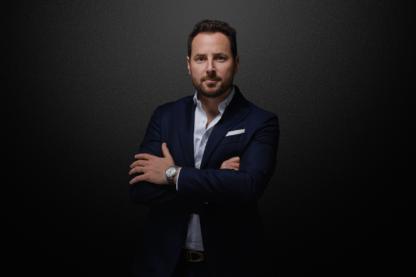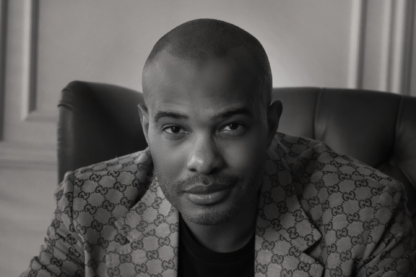In this exclusive interview, Chris Roebuck, a renowned leadership expert and advisor, shares his insights on what separates truly transformational leaders from the rest. With a career spanning military service, corporate leadership, and government advisory, Roebuck has developed a deep understanding of how leaders can inspire teams, drive performance, and navigate change effectively. Led by Alexander Chetchikov, President of the World Luxury Chamber of Commerce, this conversation delves into the key traits of high-impact leaders, the evolving role of AI in leadership, and the invaluable lessons businesses can learn from military leadership.
Alexander Chetchikov: Chris, you’ve worked extensively on leadership transformation across industries. What do you think are the key traits that differentiate a truly transformational leader from an average one?
Chris Roebuck: You can sum it up quite simply by saying it’s the difference between leaders who get people to do the job and leaders who inspire people with a compelling vision of the future so they do much more than the job.
Transformational leaders use emotion to build rapport and get things done just as much as rational thought and planning. In the mind of the employee, it’s the difference between implementing a plan and truly believing in what you are doing.
Alexander Chetchikov: As a key figure in the “Engage for Success” initiative, how do you believe organizations can create a culture that fosters long-term employee engagement and high performance?
CR: If we want to achieve the best employee engagement and high performance we have to create an environment where employees willingly give that. An employee’s decision to give their best is 60% rational and 40% emotional so they have to think that what they are being asked to do not only make sense but they believe in it.
But the big problem we have is that many leaders are not able to effectively create this environment because they have “too much work” and “not enough time”. As a result of this, they tend to focus purely on the task and forget to spend time inspiring the people. The people see this and assume that the leader doesn’t really care about them.
The simple reason for this happening is that around 80% of leaders are not being given the critical leadership skills they need to the depth they need to be able to be a good leader and build this environment. But this is actually a problem that can be quite simply and quickly solved using the right approach.
Alexander Chetchikov: From your experience leading leadership development at HSBC, UBS, and the NHS, what are the most critical leadership skills required to navigate crises and uncertainty in today’s business landscape?
CR: The first element that is critical is having a firm foundation in all the basic leadership skills, the ability to prioritize, delegate, communicate, give feedback, and manage resources. If these are not present, and they aren’t in the vast majority of leaders currently, then the implementation of everything else that follows will not be done optimally.
This means that a minority of employees are giving their best, that implementation could be 30% less effective than it should be, that the organization is performing 25% less effectively than it should be, and that it could be making 10% more profit than it currently is.
Once these skills are in place it gets leaders out of the “too much work” and “not enough time” problem which then allows them to focus on people so that they are able to motivate, to inspire, to get the best to deliver business as usual at the excellence level.
That then opens up space for them to start to become entrepreneurial leaders to look to seize opportunities to build the future not just deliver business as usual. Entrepreneurial leadership is without doubt a critical element for future organisational success.
Alexander Chetchikov: With rapid advancements in AI and digital transformation, how should leaders adapt their strategies to ensure they remain effective in engaging and managing their teams?
CR: Leaders need to recognize that AI is not a silver bullet to solve all their problems. It is a tool to enable them to be more effective in terms of turning data into valuable information for decision-making and streamlining other activities.
That is positive in that it will give leaders more time to then do what only leaders can do which is to interact with people as human beings to get the best from them.
The reality is that AI will not replace leaders simply because 80% of human communication is nonverbal, through tone of voice, body language, and facial expressions which AI cannot replicate, as in face-to-face interaction.
Alexander Chetchikov: Your leadership journey spans military service, government advisory, and corporate leadership. What are some of the most valuable leadership lessons from the military that business leaders can apply to their organizations?
CR: There are several really powerful lessons that business leaders can learn :
- That all leaders must have the critical basic leadership skills in place when they start their leadership roles, preferably from their first appointment.
- That the creation of a “we, not me” culture which the military uses to enable it to work as high-performing teams in the toughest environments will have a similar impact in business organizations.
- That it’s not just about having a good plan it’s about inspiring the team so that they truly believe in the plan and are committed to it.
- That the leader is there to serve and support the team to enable it to be successful and takes action to do that – servant leadership.
- That all great leadership is based on integrity and trust and leaders should be demonstrating and building this by their actions every day.
Thank you, Chris!
As the conversation with Chris Roebuck comes to a close, one key takeaway stands out—great leadership is not just about strategy and execution but about inspiring people to believe in a shared vision. From the military’s emphasis on teamwork to the corporate world’s need for agility and adaptability, Roebuck’s insights offer a compelling roadmap for leaders striving to build high-performing organizations. In a rapidly evolving business landscape, his expertise serves as a powerful reminder that leadership excellence is not about working harder but leading smarter.
If you want to get a more in-depth insight into the topics Chris covered in the interview and some ideas for action, check out his articles – https://chrisroebuck.live/articles
To gain more insights into the luxury industry, visit our expert articles and interviews: https://worldluxurychamber.com/category/expert-articles-interviews/





